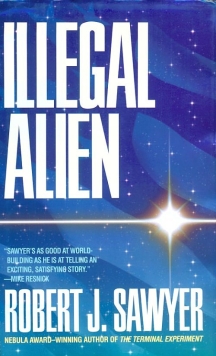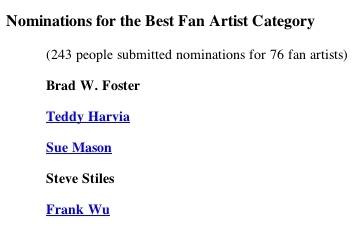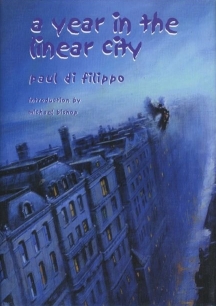The Agony Column for August 29 -> September13, 2003
Commentary by Rick Kleffel
A comfy room that was hard to leave even if a
hangar full of Hugo awards await us.

It's been more than a week since I sat in that hotel room with my wife, both of us pleasantly pooped from a day of hanging out with interesting writers and attending readings and panels. I look back at it now with more than a little nostalgia. We've been back from the vacation and tossed into the people-mover for long enough that the buzz has been subsumed by the urgent cries of family life, money and national strife. But back then we were utterly relaxed, wavering about whether or not to go to what we thought was some sort of costume ball or a Hugo history lesson. Whatever it was, it had started at 8 PM. By 8.15, I had emerged enough from my stupor so that I decided I would go and take a peek. If it was a costume ball, I'd probably flee soon enough. (Every day I masquerade as a normal person, but my anti-dress style certainly wouldn't cut it at one of these galas.) My wife, game girl that she is, got up and insisted on joining me. In the cool early evening, the streets were rather empty compared to the hustle and bustle of the day. The stroll was nice and the lobby of the convention center was almost empty.
It didn't take us long to figure out where the shindig was. There were a couple of signs, but not a great flow of people. We emerged from the escalators into some sort of makeshift backroom, walled off on our left with curtains. We could hear echoing amplified voices from behind the curtains; and no crowd sounds. We went round the curtains and found ourselves in the Hugo award ceremonies, being conducted in what was apparently an unused airplane hangar.
OK. So I guess it was the Awards ceremonies. We'd been told to follow the schedule, ignore the schedule, update the schedule. Afterwards, I looked at both schedules and saw that they indeed said Hugo Ceremonies. I had to rack my brain, but couldn't re-create the face that had told us or left us with the impression of "costume ball". I was just glad that I obeyed the whim.
We found seating in the back row; everything in front was very full. I had expected the sort of chaotic, overfilled mess we found at the opening ceremonies; a hall too small to house the guests and speakers who could neither be seen nor heard because there was no place to sit and you were forced to tip-toe to see over the milling, gabbing crowd. Instead, we found a vast hall filled with perfectly aligned chairs, a crowd as attentive and quiet as you could hope for, seats so far away the speakers' faces were tiny fingernail-sized ovals, a fantastically well set up video screen showing the speaker and sound that was clear and not as tinny or echoey as it should have been. For the number of people, for the size of the hall, it was a very nice setup.
 |
|
Spider Robinson was an excellent Toastmaster and interesting enough that I'll probably check out the next novel that falls in front me. |
Spider Robinson was the excellent Toastmaster. His voice was strong, he was clear as a bell, he was the perfect combination of funny, serious and keep 'em moving. Once again, I found myself thinking that here was a writer whose work I'd seen countless times and passed over, thinking, "Well, probably not for me." But having seen the gentleman live, the next time I saw one of his books -- just yesterday, in Capitola Book Café -- I picked it up and took a look. Might have to read one, even if he is blurbed as "the new Robert Heinlein".
 |
|
This was the last Robert J. Sawyer novel I read, and a Seiun Award winner in the 2003 Hugos. |
By the time we arrived, they were in the midst of handing out the Seiun Awards, given by Japanese fans to works translated from English. The first went to Robert Sawyers 'Illegal Alien', a so-so novel to my taste, that I'd read many a year ago. Sawyer was beaming, happy on his home ground, a Canadian hero. Greg Egan won for 'Axiomatic', a much more recent work. While I enjoyed reading his novel 'Permutation City', I'd never got round to reading the other novels I bought by him. I frankly enjoyed the huge increase in value of my first edition hardcover a bit more. Yeah, mercenary, right -- I haven't sold it yet.
Wen Spencer, who I've never read, won the John W. Campbell award. I flashed back to the panel on John W. Campbells, where Cory Doctorow had entertained us all with tales of how the award opened up one door once. Good luck to you, Wen, I thought. Alas, I'd never read any of the contenders. Look, I'm not that big an SF fan, and short fiction rarely manages a spot in the queue. I'll admit it. This web site is a testament to that.
 |
|
A picture of the Hugo fan art nominees, demonstrating the incredible graphics brought to the proceedings. |
Sue Mason won the best Fan Artist; the only name I was familiar with in the list was Frank Wu, from his collaboration with Jay Lake titled 'Lake Wu'. But that seemed to me to be a professionally published piece of work. Like many readers, I've never been able to suss precisely how the Hugos decide the line between fan and professional. I would have classified Frank Wu as a pro, but what do I know? Doodly oodly, it seems. I certainly don't know what any of the artists' art looks like. That screen showed us the names but not the art. I was pretty sure that it was not a text-only projector.
Nonetheless, like many I was happy to see Dave Langford win the Hugo again for best fan writer. He seemed overwhelmed by the award and the acclaim. It was a sweet moment of honest emotion on stage. He told us to stop giving him these things, but I don' think anyone is so inclined. I just got Langford's chatty, entertaining e-zine Ansible, issue number 194, and on the laptop I have an interview with the man that is waiting for an edit and audio scouring. It will be delivered, soon, I promise, and is very much worth the wait.
 |
|
Cheryl's Hugo nominated website. Cheryl's in the center of that picture, practicing for next year. |
OK, now as far best Fanzine, I did know one of the nominees quite well, the ubiquitous Cheryl Morgan of Emerald City. It was her first nomination, but alas, the outgoing year for the publication of what's apparently a classic zine, Mimosa. They were happy to take home the well-deserved award after 21 years of hard work. The mind boggles. I'd seen Cheryl now and again through the Con, and she was a busy bee, apparently part of the clockwork that makes the things work. It was nice to see that web 'zines were worthy of consideration, especially since they're a lot more easily found than the printed variety. But again, it's likely I reveal my cluelessness. And my cluttered schedule that allows no time reading examples of the very material I write.
Now here's the weird thing. Dave Langford, who won for best fan writer was nominated for best semi-prozine. It's the kind of thing that makes those of us on the edges of fandom roll our eyes. Especially when he's up against someone like the winner, Locus, which is a totally professional, bi-monthly magazine. How is that -- or Interzone, or The New York Review of Science Fiction -- semi-pro?
David Langford was kind enough to answer this question via email. Here's his story:
Ah, well, there's history here. The "Semiprozine" Hugo was created solely to kick =Locus= out of the Fanzine category, which by 1983 it had won eight times (five times running from 1978). So from 1984 =Locus= had eight straight wins as Semiprozine....Now the definition of Semiprozine is weird and partly optional, presumably as a result of complex compromises when the category was first debated. A semiprozine is a publication which meets any two criteria from a list including "circulation greater than 1,000", "pays contributors other than in copies", and "declares itself to be a semiprozine". So I naughtily argued that since =Ansible= has a circulation well over 3,000 in e-mail alone, and since I occasionally reward contributors by buying them drinks, it was of necessity a semiprozine. Saying so in print confirmed this, since =Ansible= had thus declared itself a semiprozine.
This ploy began as a joke against the perversity of the category rules, but enabled me to escape backbiting about =Ansible='s unfair edge (i.e. high circulation by e-mail) giving it an unfair advantage over traditional printed fanzines, by legitimately transferring it to a category where the competition is much tougher. It's had five fanzine Hugos, after all. The result was to let =Emerald City= into the fanzine shortlist, so I'm sure you approve....
And I do approve, but, he sputtered, but -- For many of us, the way the Hugos are divvied up just doesn't make a lot of sense. Yes, I know that the process of changing them is complicated and fraught with unseen infighting. And well they should be; sometimes I'm tempted to think they need some army led by a beneficent dictator, say Harlan Ellison -- to come in and make the trains run on time. Yet I can imagine such a statement makes many readers' hair stand on end.
Once the subject of a teapot tempest, the Hugo dramatic presentation has been split into short and long form. Here, the video screen was used to excellent effect, and proved that it was not in fact text-only. Clips from each choice were run and even in a few seconds they showed a world of difference. For semi-mental reasons, two, yes two episodes of the turgid but well-meaning 'Enterprise' were chosen. I stayed awake through both (though not through the original episodes.) Then we saw a clip from Joss Whedon's Buffy the Vampire Slayer's 'Conversations with Dead People'. There was no comparison; from stupid starships to sharply-written dialogue, clever conceptualization and drama. Then we got a glance of Whedon's SF vehicle 'Firefly', the episode 'Serenity'. It just confirmed our very unpopular opinion voiced the night before; it looked terrible. Two guys laying in the dirt shouting. Some of the worst art mis-direction I've had the displeasure of bouncing into my eyeballs. Seconds later, a clip from Whedon's 'Angel', beautiful, elegiac, sumptuous. Buffy won, as I believe that the musical episode had been stiffed in some prior incarnation. The result was that horror genre fiction won out over science fiction at the SF con. Go figure. At those times, we just say that it's Speculative Fiction, right? Though I don't think anybody's speculating that there might be vampires, other than in government.
I'd met Bob Eggleton at the last Worldcon, and was pleased to see his Hugo here. And that was all I saw, as the planner once again didn't see fit to use that big ol' screen to show an example shot of each nominees work. Missed opportunity that. File it away under lessons learned, if indeed it is learned. Presumably we were supposed to be familiar with the work of these big names. But though we've all bought the books, not all of us are obsessive enough to check the cover illo credit. I would have been equally pleased to see Jim Burns, who does so much stellar work for UK publisher Victor Gollancz.
The all-seeing eye of science fiction -- John Clute -- presented the award for best editor. Looking at the field of nominees -- Ellen Datlow, Gardner Dozois, David G. Hartwell, Stanley Schmidt and Gordon Van Gelder -- you realize why science fiction is so strongly blessed with short stories. With a huge number of such hugely talented editors -- there are probably as many missed who are equally stellar -- it's no wonder that the field draws in so many short story writers. There's really no equivalent in the literary field. The sheer number of editors with so much experience, so much to say, so much advice to lend the young writers seems unique to the science fiction genre. It's a fascinating microcosm, science fiction. More fascinating is that this microcosm takes as its subject the cosmos. Funny how the business of art is so full of inversions.
Best related book was surprisingly enough a category I'd not heard of and I'd not heard of any of the nominees. It was a wide range of weird stuff. From 'The Battle of the Sexes in Science Fiction' by Justine Larbalestier from Wesleyan University Press, to 'Dragonhenge' by Bob Eggleton, to 'Bradbury: An Illustrated Life' by Jerry Weist, to 'Spectrum 9: The Best in Contemporary Fantastic Art' to the winner, 'Better to have Loved: The Life of Judith Merril by Judith Merril and Emily Pohl-Weary, you could see themes and types of books rising and falling into the primordial ocean of literature. Judith Merril won for her work. Some of the names were familiar, but the works, all of them, had managed to escape me.
Best Long Form Dramatic Presentation -- feh, of course it was going to go to LOTR 'The Two Towers', Peter Jackson's second chapter in the immense and perfectly done epic. You got yourself a series of clips again, nicely done; long enough to get a feel, short enough not to bore or annoy, mostly. 'Spirited Away' was the second best, in my opinion, and in any other field would have been my pick to win, even though it's in no way science fiction. Neither is LOTR, but at least it has more years of association with the genre than most of the people there have been alive. 'Spider-Man' had some nice writing and acting (which you saw in the clip), but the web-swinging effects tended to look a bit like a video game. If you have kids who play video games, it can ruin whole hordes of SF movies for you. And I hated 'Minority Report'; it looked terrible even in the short bit we saw. They took a great story and ruined it with Nike ads, bad acting, bad direction, and bad effects. Yikes. Harry Potter was outside my radar. It shall remain so.
OK we're winding down now; I hadn't read any of the short stories, so I was unmoved by Geoffrey A. Landis win for 'Falling Onto Mars', though I suspect I own the story in a Golden Gryphon collection. I have to say that the titles alone of two of the selections grabbed my interest. '"Hello," Said the Stick' and 'The Little Cat Laughed to See Such Sport', both by Michael Swanwick broke through my usual barrier of indifference, or actually, lack of time for reading short stories. I'm still intrigued. Now I own the Golden Gryphon Collection that I bet 'Creation' by Jeffrey Ford was collected in, and I know Ford's work well enough to be immediately prejudiced towards him. And heck, even the title of 'Lambing Season' by Molly Gloss has the right suggestion of hidden terror. But I hadn't read any of them, and I don't think I voted in that category. If so, it was probably for the Ford.
Ditto for best novelette, though I was pulling for Charles Stross. Hell, I'd been stalking the guy to no avail for four days, the least I could do is root for him. Damned if I didn't vote for him, even though I hadn't read the story. But I'd talked to him a lot --it seemed to me -- at the last conference. And you wonder why the Hugos are a bit on the wonky side? Of course, I have a long-established liking of Ursula K. Leguin and no knowledge of her entry, 'The Wild Girls'. My wife has long ago read and enjoyed Mauren F. McHugh's 'Half the Day is Night'; she was nominated for 'Presence'. Gregory Frost was nominated for 'Madonna of the Maquiladora', but Michael Swanwick won for his novelette 'Slow Life'.
 |
|
I consciously voted for this novella. I read it and everything. |
Now here are the best bits. I'd read two of the Best Novellas and voted for Paul Di Filippo's 'A Year in the Linear City'. I hadn't read Ian R. Macleod's 'Breathmoss', though both Serena and I enjoyed 'The Light Ages'. Richard Chwedyk's 'Bronte's Egg', 'In the Spirit' by Pat Ford and 'The Political Officer' by Charles Coleman were all victims of my disinclination to read SF magazines.
Yes, I'd really enjoyed the winner 'Coraline', and I loved Neil Gaiman's reprise of last years' [horror/magic-realism wins Hugo for best Science Fiction novel go figure] speech "Fuck I won a Hugo." He seemed so likeable, that little doll-like guy on stage. He radiated "I'm a nice guy" all the way to the back row. I'll even grant that 'Coraline' is science fiction, uh ish. But Di Fillippo's novella contained so much life in so little space. I must also admit to living PS Publishing's dedication to this format; they've published at least two feet of novellas since their inception with James Lovegrove's 'How the Other Half Lives'. Ah heck.
The finale -- best novel -- was no sure thing on any count. By my estimation, Michael Swanwick had a excellent chance. 'Bones of the Earth' which made my wish-I'd-read-it list, seemed a not-unlikely winner by virtue of Swanwick's being nominated for two other awards; but he'd just won one. Clearly a lot of people like the guy. His books are stacked on my shelves, but I've not got round to reading anything beyond 'Vacuum Flowers', which I really liked. I'd read a Usenet newsgroup review -- scathing, ill-intentioned, badly-written , but unpleasantly memorable -- of 'Hominids' which had, alas, stuck in my mind like a terrible teeny-tune, so I'd given it the skip. David Brin's 'Kiln People' had some interest for me, but it was another in the "kinda wanted to read it" pile. Of course, I was pulling for China Mieville's 'The Scar'. China's also a hell of a nice guy, and moreover, he has the kind of volcanic imagination that is able to seamlessly combine science fiction and fantasy and horror in such a way that it at least seems rather just that he be nominated and even receive an award. I'd never read 'The Years of Rice and Salt', or any other Kim Stanley Robinson. One of my friends knows his parents through some weird chain of events. And I must admit that reading John Clute's review of the book in SciFi Weekly had whetted my appetite. But it was another one in the "best intentions" pile.
George R. R. Martin's presentation of the award was scathingly funny, though I must say, he seemed a bit on the churlish side. Still, he toed that line like the pro he is, kept it short and made everyone laugh lots of times before he presented the award to hometown hero Robert J. Sawyer.
And that was that. Throughout, Spider Robinson kept the ceremony at a brisk clip. I usually won't sit through any awards ceremony without getting well, bored shitless. This one was a model for the way they should be run. Quick, funny, well done, organized, never overlong. Though I must say that in letting us leave, THE VOICE OF GOD was pretty stern. He made sure everyone left in a fashion as orderly as the awards were run, though not quite as brisk, ostensibly in order to keep things from gumming up outside. And they never did gum up outside.
I must say that Claire and I were pleased we'd made the awards. It was great fun, quite interesting and overall, it was a polished piece of work. Except for the fact that we almost didn't go. That organization bit had almost had what would have been a fatal impact on our experience. Fortunately, morbid curiosity won out over inertia.
And then afterwards...the parties. The Worldcon parties. Once again, morbid curiosity won out over inertia. Well, we'd not been invited to any specific parties, but having heard so much about Worldcon parties, and with so many of them being held in our hotel, it seemed like we should at least take a gander. After a very late dinner, we strolled back to our hotel and wandered the corridors of the second floor. It was reminiscent of the dorm parties of yore, only with a lot less smoking and drinking. By the time we'd made a couple of circuits and got the gist of it, we were ready for nighty-night. We still had a couple of very full days to go.